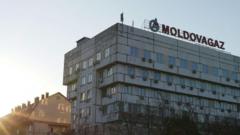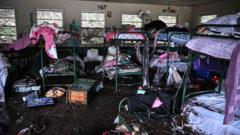As the new year dawns, Moldova faces an acute energy shortage after Kyiv's refusal to extend a transit agreement with Gazprom, leaving the nation, especially the separatist region of Transnistria, in a vulnerable position.
Moldova's Energy Emergency: Russian Gas Supply Cut Sparks Crisis

Moldova's Energy Emergency: Russian Gas Supply Cut Sparks Crisis
Moldova grapples with a dire energy crisis following the cessation of Russian gas flow through Ukraine.
In Transnistria, where Moscow's loyalty prevails, the local population is already feeling the chilling effects of energy deprivation. "The hot water was on until about 2 am, I checked. Now it's off and the radiators are barely warm," shares a concerned local resident, Dmitry. While gas remains in the system, the pressure is dangerously low. Transnistria, which broke away after the Soviet Union's dissolution, remains dependent on Russian gas, funding which the Moscow-backed authorities try to evade.
The energy lifeline has notably faltered as winter temperatures drop. Local governments are scrambling to set up "heating points," and communities are adapting by gathering in single rooms and insulating against the cold. Only critical infrastructure, such as hospitals, is receiving heat. With forecast lows nearing freezing, residents question how much worse conditions will get in the coming weeks.
Electricity from Transnistria’s Kurchugan power plant is still operational but reliant on coal, which is dwindling, raising fears of blackouts. Chisinau, the capital of Moldova, claims it can manage gas supplies until spring and intends to rely on imported electricity, though this will lead to a significant financial strain on the nation.
The goal to transition away from Russian energy resources has been slower for neighboring Slovakia and Hungary, which may also feel the impact of the gas halt. Moldova, already economically fragile, may face severe consequences if the energy crisis continues.
Moscow seems to leverage the situation, potentially aiming to orchestrate instability in Moldova ahead of the parliamentary elections in 2025. The Moldovan government accuses Russia of engineering a security crisis to provoke unrest, particularly as the relationship between the two countries remains fraught since Moldova's pivot towards the European Union following Russia's military actions in Ukraine.
Despite promises of EU integration, realities surrounding energy and economic challenges loom heavily over the Moldovan populace. In Tiraspol, where many already live at the margin, the prospect of freezing conditions paired with rising costs threatens to drive an even deeper wedge between the region and Chisinau.
Analysts predict that if the hardships continue unchecked, pro-Russian parties could gain traction in upcoming elections. As the humanitarian crisis intensifies, Moldova stands at a critical junction, with urgent decisions needed to stabilize the energy supply and shield the future of its governance in the face of encroaching Russian influence.
The energy lifeline has notably faltered as winter temperatures drop. Local governments are scrambling to set up "heating points," and communities are adapting by gathering in single rooms and insulating against the cold. Only critical infrastructure, such as hospitals, is receiving heat. With forecast lows nearing freezing, residents question how much worse conditions will get in the coming weeks.
Electricity from Transnistria’s Kurchugan power plant is still operational but reliant on coal, which is dwindling, raising fears of blackouts. Chisinau, the capital of Moldova, claims it can manage gas supplies until spring and intends to rely on imported electricity, though this will lead to a significant financial strain on the nation.
The goal to transition away from Russian energy resources has been slower for neighboring Slovakia and Hungary, which may also feel the impact of the gas halt. Moldova, already economically fragile, may face severe consequences if the energy crisis continues.
Moscow seems to leverage the situation, potentially aiming to orchestrate instability in Moldova ahead of the parliamentary elections in 2025. The Moldovan government accuses Russia of engineering a security crisis to provoke unrest, particularly as the relationship between the two countries remains fraught since Moldova's pivot towards the European Union following Russia's military actions in Ukraine.
Despite promises of EU integration, realities surrounding energy and economic challenges loom heavily over the Moldovan populace. In Tiraspol, where many already live at the margin, the prospect of freezing conditions paired with rising costs threatens to drive an even deeper wedge between the region and Chisinau.
Analysts predict that if the hardships continue unchecked, pro-Russian parties could gain traction in upcoming elections. As the humanitarian crisis intensifies, Moldova stands at a critical junction, with urgent decisions needed to stabilize the energy supply and shield the future of its governance in the face of encroaching Russian influence.






















